
German-Canadian composer honoured
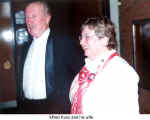 June
14, 2001, was a special day for Alfred Kunz, composer, arranger, and
conductor. The Senate of the University of Waterloo bestowed on him the
degree Doctor of Laws, honoris causa, and invited him to address the
graduands at the Spring Convocation ceremonies for the Faculty of
Arts.
June
14, 2001, was a special day for Alfred Kunz, composer, arranger, and
conductor. The Senate of the University of Waterloo bestowed on him the
degree Doctor of Laws, honoris causa, and invited him to address the
graduands at the Spring Convocation ceremonies for the Faculty of
Arts.
In this way the university could recognise and celebrate Alfred Kunzí outstanding contribution to the University of Waterloo, as the universityís President put it. His leadership in the early years of musical education, to the fields of musical composition, education and choral performance, and to the musical culture of southern Ontario are thus being given the proper acknowledgment.
Mr Kunz was also asked if he could create a musical offering of his work, which took place the night before in the Humanities Theatre Hagey Hall. Many of the composerís admirers turned out to here a rare evening full of his extraordinary creations.
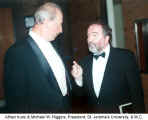 The
evening began with a warm welcome by David Johnston, President of the
University of Waterloo and an introduction of Alfred Kunz by Michael W.
Higgins, President of St. Jeromeís University, and a most humorous and
sincere Master of Ceremonies for this evening.
The
evening began with a warm welcome by David Johnston, President of the
University of Waterloo and an introduction of Alfred Kunz by Michael W.
Higgins, President of St. Jeromeís University, and a most humorous and
sincere Master of Ceremonies for this evening.
That evening 24 pieces of choral music were performed, 10 of which were Mr. Kunzís own compositions. All instrumental arrangements for the performed pieces were also by Mr. Kunz.
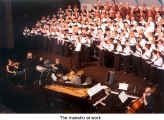 His
musical genius became apparent right at the start with "Wonder of
Wonders", a haunting composition, placing a few well-chosen voices
literally in different ranges and places, leaving an impression of astral
sound. Followed by the familiar sounds of "The Beautiful Blue
Danube" by Strauss and another one of Mr. Kunzís composition,
"Lake Huron in October", the audience could instantaneously grasp
his broad range of capabilities.
His
musical genius became apparent right at the start with "Wonder of
Wonders", a haunting composition, placing a few well-chosen voices
literally in different ranges and places, leaving an impression of astral
sound. Followed by the familiar sounds of "The Beautiful Blue
Danube" by Strauss and another one of Mr. Kunzís composition,
"Lake Huron in October", the audience could instantaneously grasp
his broad range of capabilities.
A special treat was the premier performance of his newest work, "Ave Verum Corpus". While this piece is following the tradition of any self-respecting composer of sacral works, it offers at the same time a few new reflections of more modern sensibilities and passages that move the listener to a slightly more disquieting place than more traditional pieces do.
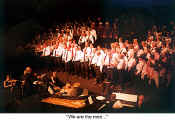 Throughout
the evening, with an interesting mix of the traditional and popular, as well
as the folk and sacral sounds of choral music, one was aware of the
diversity Alfred Kunz is capable of and totally at home in. The choirs he
conducted respond with ease to him. Even when all the choirs sang together,
the Millennium Choir and its various sections, the Concordia Mixed Choir,
the Concordia Male Choir, the voices rose harmoniously to his direction.
From the tone poem of a Shakespeare Sonnet by Alfred Kunz to the haunting
"Dry your tears, Africa" by John Williams the audience responded
to the sometimes amusing, often enlightening comments of Michael Higgins as
enthusiastically as to the music itself.
Throughout
the evening, with an interesting mix of the traditional and popular, as well
as the folk and sacral sounds of choral music, one was aware of the
diversity Alfred Kunz is capable of and totally at home in. The choirs he
conducted respond with ease to him. Even when all the choirs sang together,
the Millennium Choir and its various sections, the Concordia Mixed Choir,
the Concordia Male Choir, the voices rose harmoniously to his direction.
From the tone poem of a Shakespeare Sonnet by Alfred Kunz to the haunting
"Dry your tears, Africa" by John Williams the audience responded
to the sometimes amusing, often enlightening comments of Michael Higgins as
enthusiastically as to the music itself.
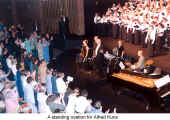 In
the end there was of course a longstanding ovation for the Maestro who was
going to be given his special honour the following day, but received instant
thanks and admiration from a grateful audience.
In
the end there was of course a longstanding ovation for the Maestro who was
going to be given his special honour the following day, but received instant
thanks and admiration from a grateful audience.
As a community we are well aware of Alfred Kunzís contributions to the field of music.
He has always generously shared his talents with us at many important occasions. We thank him and congratulate him to this well-earned honour.
See you next time
Sybille Forster-Rentmeister
Comments to: sfr@echoworld.com

